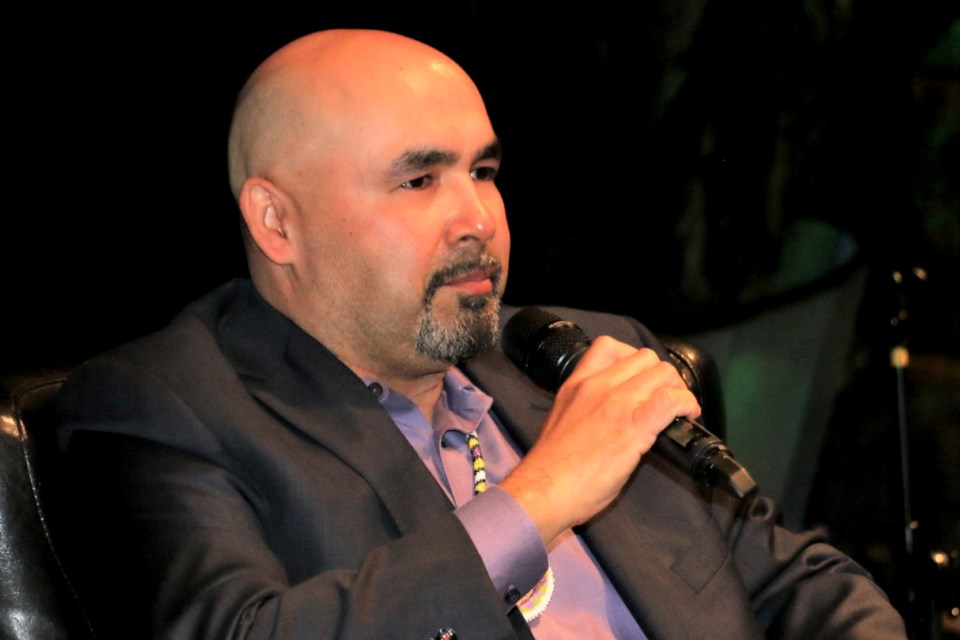A Northern Ontario First Nations leader said Ontario needs to learn from British Columbia on how to encourage and include First Nations in business initiatives so that they too can enjoy the benefits of economic development.
Craig Nootchtai, the Gimaa (chief) at Atikameksheng Anishnawbek nation west of Sudbury, was one of several First Nations speakers at the BEV (for ‘battery electric vehicle’) In Depth conference held at Science North last week that brought together municipal leaders with automotive and mining industry representatives to explore economic development related to BEVs.
Nootchtai said some of the early treaties signed with First Nations were because the British wanted to take advantage of mining and logging.
"And I say that it's important because the reason why there are treaties is because of mining. You know, there was a lot of mining in the early 1800s in the States, in the lower part of Canada, and basically, the mining companies and the British Crown wanted to not overtake First Nations or the Native peoples, they wanted to have treaties with them, so that they could get their consent to mine the resources in their traditional areas, and on their reservation lands," Nootchtai said.
He said his great, great, great, great grandfather was one of those who signed a treaty on behalf of his nation.
Nootchtai said one of his roles now is to honour the treaty and not to challenge business or government, but to be a partner.
"I'm a treaty partner, I have actual rights to the ownership of this land. And so I want to be, on behalf of our nation, I just want to say, we want to be partners. We want to be sitting at the table with the decision-makers when it comes to any type of regulatory framework."
He said listening to the discussions between government and industry he came to realize how far behind the First Nations are on the issue of mining critical minerals and developing a BEV industry in Ontario. He said it is time for all partners to cooperate.
"I just wanted to make it clear that we're not a challenge. We are not. We are a partner, you know. We are business-oriented, we're growing, you know, and we just want to make sure that we have our seat at the table and be participants in all of this," Nootchtai said.
He added that one of the things the First Nations can bring to the table is land.
"We have land, you know," Nootchtai said. "For all of you industry proponents that are thinking about either manufacturing the batteries or supplying, we have land where you can build your plants. Why not come talk to us? he said.
Commenting on the participation of First Nations in resource development, Nootchtai said an analogy would be the children's game of musical chairs. He said there are only three chairs but there are four players; business, the provincial government, the municipality and the First Nations. He said government and industry are all talking about the regulatory framework, the environment and various jurisdictions; something that Nootchtai said the First Nations are not told about or invited to comment about.
While all this is going on, Nootchtai said the musical chairs game keeps going.
"And then as the music stops, which it will, guess who's going to be the one left standing? It's going to be the First Nations. It's because we don't have the capacity at times to understand the industry, or the processes or the legislation during the regulation."
He said he was recently in British Columbia and was amazed to see the level of participation by First Nations in business initiatives. He said the BC provincial government encourages business and industry to work with First Nations.
"It's a much different atmosphere over here in Ontario. It's much different. We have such a hard time getting to the table with industry proponents and with government in general, really. And again, that's all we're asking is we want to be at the table. We want to learn this business with you. We want to understand. We want to go through the ups and downs as you do," Nootchtai said.
He said the BC government encourages First Nations by providing more in the way of financial resources to promote economic development.
“In Ontario, we don't," Nootchtai said. "We get maybe $60,000 a year to help manage the resource development in the Sudbury basin — $60,000. That's not really even enough to hire someone with the credentials to understand mining, forestry, aggregates, energy," he said.
In the context of musical chairs, Nootchtai said he will be left standing when the music stops.
"I guess what I'm going to have to do, I'm gonna have to go and make a chair for myself and put myself at the table," Nootchtai said.
Len Gillis covers mining and health care for Sudbury.com.



